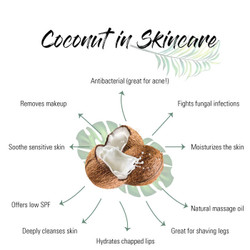Coconuts. They’re everywhere – and for good reason! Coconut isn’t just a tropical aroma or delicious addition to your meals, coconut and its derivatives, such as coconut oil, have proved to be useful in so many areas of life, from cleaning to skincare.
Unfortunately, some people suspect they have an allergy to this wonder-ingredient…but they could be avoiding it unnecessarily. But don’t worry; we have our very own patch-test system below that you can use to help determine whether this is the case for you.
Coconut in skincare
Coconut doesn’t just have incredible health benefits; it’s also a wonderful ingredient to use topically. Unlike so many conventional, synthetic cosmetic ingredients, studies point toward the fact that generally, coconut oil is safe to use in skincareand has outperformed popular synthetic cosmetic ingredients, so unless you really do have an allergy, there is nothing to worry about – although we do always recommend a patch test before use of any skincare product!
We love using coconut in our own organic skincare, particularly coconut oil. This ‘miracle’ oil of the Tropics suits all skin types and is light, non-greasy and rapidly absorbed giving deep hydration and conditioning to skin, scalp and hair. It has even been shown to speed up wound healing and is gentle enough for those with very sensitive skin.
When Could Coconut Cause an Allergy?
In our skincare, we specifically select cold-pressed, organic, virgin coconut oil - this is a world apart from the chemically refined, bleached and deodorized conventional type.
This is important to take note of, because the use of a chemically refined ingredient or even a pesticide-laden one could cause a reaction, rather than coconut.
The likelihood of a reaction to a synthetic chemical like a pesticide, rather than coconut itself is higher – studies have pointed toward the fact pesticides are allergenic/have allergenic effects.
This principle is true for all ingredients – always look for independent organic certification, which guarantees no pesticides have been sprayed and ensures the high quality and purity of the product.
Isn’t coconut oil comedogenic?
If you’re wondering if coconut oil contributes to clogged pores and acne, we have to say no! This is a misconception and sadly scares people away from coconut-based skincare that could actually leave their skin clear and glowing!
The notion that coconut oil is comedogenic comes from old studies where comedogenicity of coconut oil was tested on rabbit’s ears. This method of testing was not reliable – the extremely high concentration of coconut oil combined with the inaccuracy of animal testing produced a result that would not be mimicked in a real-life circumstance on a human.
Of course, we are all different and some of us do have specific sensitivities or allergies to ingredients, which can cause less-than-desirable effects, but this has to be determined by each individual.
Cocamidopropyl betaine
Cocamidopropyl betaine is a natural, coconut derived compound often found in cosmetics that could be the ingredient that is causing you issues. It is thought, for some, that this ingredient causes ‘contact sensitization’ – in other words, when it comes into contact with the skin, you may notice sensitivity or irritation, however the prevalence of this occurring is still very small.
Interestingly, one study found that patients, who suffer with reactions to cocamidopropyl betaine, do not suffer with coconut oil as a whole. The results of this study also suggested that reactions to cocamidopropyl betaine are not likely to be a true allergic reaction, but irritant dermatitis instead.
However, we do not use this ingredient in our products.
Do I have a coconut allergy?
If you suspect you have an allergy to coconut, it’s worth finding out, because you don’t want to unnecessarily miss out on all the benefits it can offer.
Unlike tree nut allergies, an allergy to coconut is rare, although is more frequent when used topically than it is when consumed. Coconuts are often confused as a tree nut, but we can assure you they aren’t, they are actually classed as a fruit! Allergies to tree nuts are more prevalent; which can include walnuts, peanuts, pecans, hazelnuts, pinenuts, macadamia nuts, almonds and argan.
These aren’t used in our skincare, either.
If you suspect a severe coconut allergy (especially when consumed), go to a healthcare practitioner who can assess you under controlled circumstances.
A topical reaction to coconut can include:
- Eczema/rash
- Hives
- Itching
When eaten, a coconut allergy can cause:
- Nausea & vomiting
- Swelling.
- Severe reactions, called anaphylaxis– but this is extremely rare.
- Wheezing, coughing, or a runny nose.
But remember, true coconut allergies are rare.
Test it yourself!
To test whether you have a topical reaction to coconut, you can do so by performing a patch test. Apply a small amount of the product directly onto the skin – usually on your inner elbow or behind your ear – and leave for a number of hours before assessing the impact.
If you are interested in trying this experiment, please sign up at the bottom of the article for a free sachet of our Timeless Rose Moisturizer. Our moisturizer contains coconut oil, which is high in protective antioxidants and antibacterial fatty acids to keep the skin nourished.
If you notice a reaction, then you may well have an allergy to coconut, but if your skin is fine, coconut should be okay to use topically in skincare – hooray!
If you'd like any more advice on skincare, don’t hesitate to ask us! Email us at customercare@odylique.co.uk or add your question as a comment below – we're here to help!


